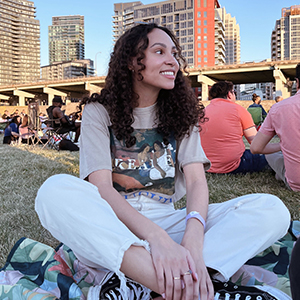
On April 20, 2021, white ex-police officer Derek Chauvin, 45, was found guilty of second-degree murder, third-degree murder and manslaughter in the death of unarmed Black man George Floyd, 46. Floyd died after Chauvin knelt on his neck for more than nine minutes during an arrest on May 25, 2020 in Minneapolis, Minnesota. Chauvin had pleaded not-guilty to all charges.
After receiving the jury’s verdict, Chauvin’s bail was revoked, his bond was discharged and he was taken into custody. His sentencing is set to take place in two months and he is currently facing up to 40 years in prison.
Recap: What happened to George Floyd
George Perry Floyd Jr. was an African-American man who was arrested by police after a convenience store clerk alleged he was using a counterfeit $20 bill to purchase cigarettes. Derek Chauvin, one of four police officers who arrived at the store to arrest Floyd, knelt on Floyd’s neck and back for more than nine minutes as he struggled to breathe. He and bystanders called for help repeatedly, but he fell unconscious while Chauvin pinned him down. He died while in police custody.
The arrest was filmed by teenage onlooker Darnella Frazier, whose footage went viral and was used at Chauvin’s trial to disprove the police officers’ accounts of the murder. The initial news release from the Minneapolis Police Department read “Man Dies After Medical Incident During Police Interaction.” It said Floyd, who was not named at the time, “physically resisted officers.” However, Frazier’s video showed Chauvin on top of Floyd despite his insistence he was struggling for air.
During the trial, medical experts for the prosecution determined Floyd’s cause of death was asphyxia, or lack of oxygen. They said his breathing was constricted as a result the way he was held down with his face and neck pressed into the ground.
Floyd’s death ignited waves of global Black Lives Matter protests, with people around the world calling for racial justice and an end to police brutality. It is potentially the largest mass protest movement in U.S. history.
Related: 10 common phrases you didn’t know were racist.
Reactions to the verdict
Many celebrities weighed in to share their feelings on the guilty verdict on social media.
Viola Davis:
Chris Evans:
Justice. Sending love to George Floyd’s family and friends.
— Chris Evans (@ChrisEvans) April 20, 2021
Oprah Winfrey:
Lili Reinhart:
Guilty on all charges. I am holding back tears on set. 🙏🏻 this is so incredible and I pray a step in the right direction for all racial injustices in this country 😭 #GeorgeFloydTrial
— Lili Reinhart (@lilireinhart) April 20, 2021
Katy Perry:
rest in JUSTICE George Floyd ♥️
— KATY PERRY (@katyperry) April 20, 2021
Zoe Kravitz:
Kerry Washington:
A guilty #verdict. But this fight for justice is not over. We have a lot of work to do. There is more fight ahead of us. But RIGHT NOW please take CARE of yourself. And let’s take care of each other. Prayers and love to the family of #GeorgeFloyd.
— kerry washington (@kerrywashington) April 20, 2021
Kerry Washington’s tweet was one of the more nuanced reactions, as she addressed the verdict being the first step in an ongoing battle. While it’s easy to be relieved that the trial is done, Washington is right — things are far from over. Since Chauvin’s trial started, 64 more people have died at the hands of police in the U.S. and more than half were Black and Latino.
The verdict is only one outcome and it’s a rare one — cops often don’t face serious legal consequences for police brutality. At the end of the day, systemic racism exists and Black men and boys face a higher lifetime risk of being killed by police than any other group – research suggests that approximately 1 in 1,000 American Black men and boys will be killed by police during their lives.
We aren’t exempt from this in Canada either. Here, a Black person is more than 20 times more likely to be shot and killed by the police compared to a white person.
Related: Defunding the police: What it could mean for mental health in Canada.
Accountability vs. justice
While many celebs celebrated “justice for George Floyd”, the verdict actually highlights an important takeaway: there is a difference between accountability and justice. The Attorney General of Minnesota, Keith Ellison put it simply in a press conference after the verdict:
Minnesota AG Ellison reacts to verdict in Derek Chauvin trial:
“I would not call today’s verdict, ‘justice’…because justice implies true restoration. But it is accountability, which is the first step towards justice.” pic.twitter.com/PZrrwcHi7i
— MSNBC (@MSNBC) April 20, 2021
According to Merriam-Webster, accountability is the quality or state of being accountable. It means there is an obligation or willingness to accept responsibility for one’s actions. The jury decided Chauvin should be held accountable for killing Floyd, thus being sent to prison is accountability for his actions.
Justice is more concerned with fair treatment and righteousness. If Floyd had been treated fairly, losing his life would never have been a possibility.
Congresswoman Cori Bush explained that distinction a tweet:
Our hope is that this verdict will be a small step towards accountability. But that’s just about accountability, not justice.
For us, justice would be George Floyd alive today.
— Cori Bush (@CoriBush) April 20, 2021
True justice would mean others slain by police such as Tamir Rice, Breonna Taylor or Daunte Wright would still be alive, and the system to get accountability for their families and loved ones would not have failed them.
The verdict is a reminder that ending racial injustice isn’t as simple as one police officer ending up behind bars. While it may feel like a small victory, there is still work to be done to dismantle racist systems to ensure equity for all.
Related: On a budget? Here are 11 ways you can still support social justice issues in Canada.


